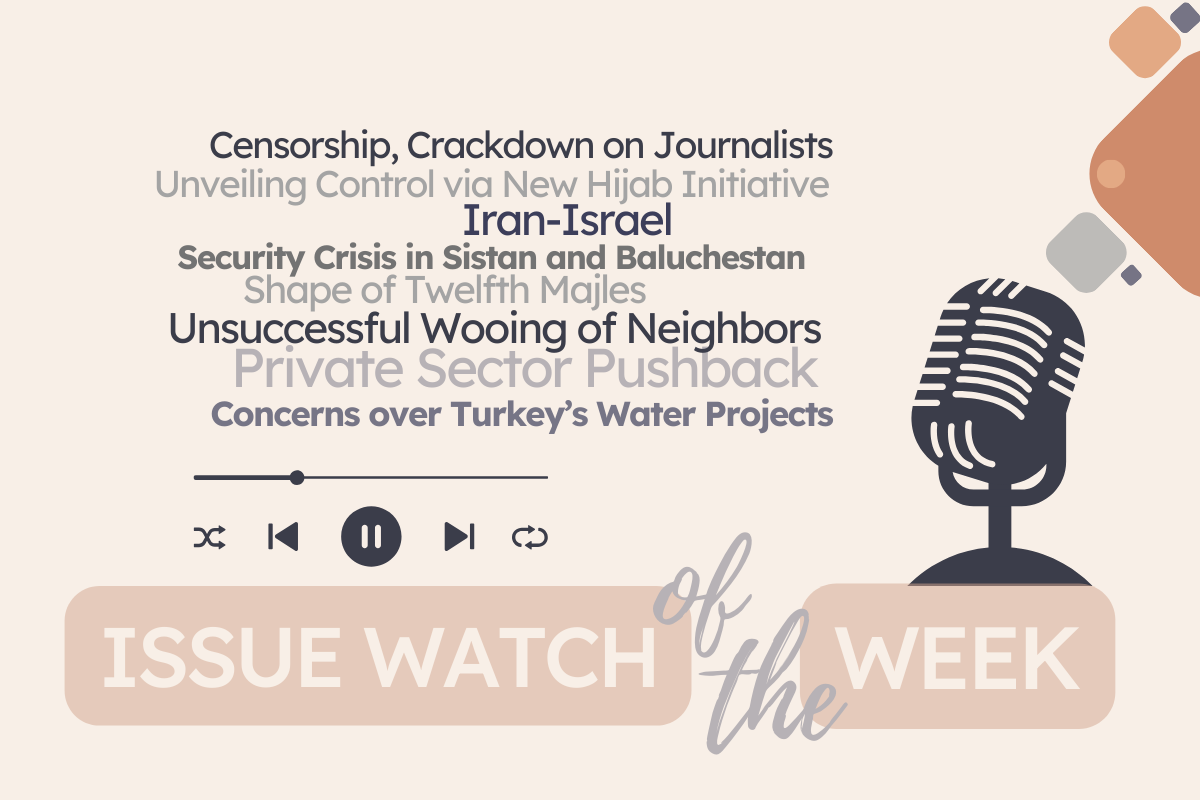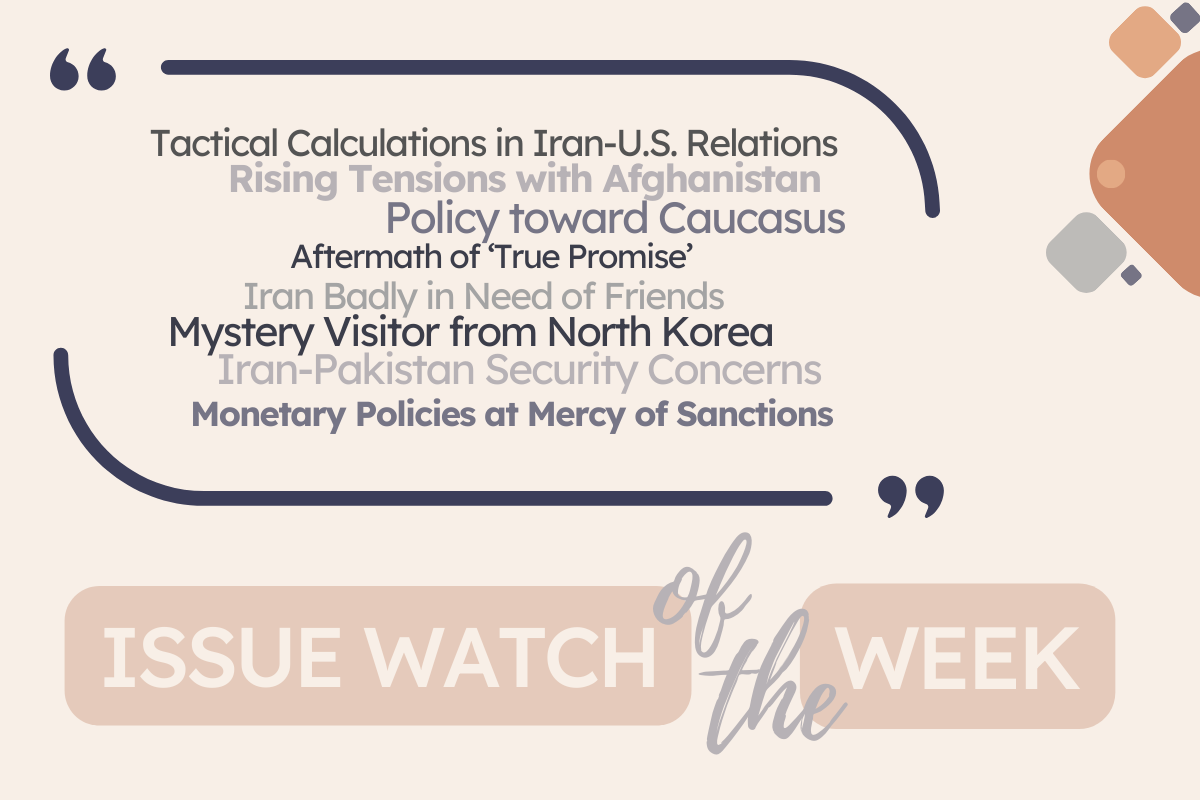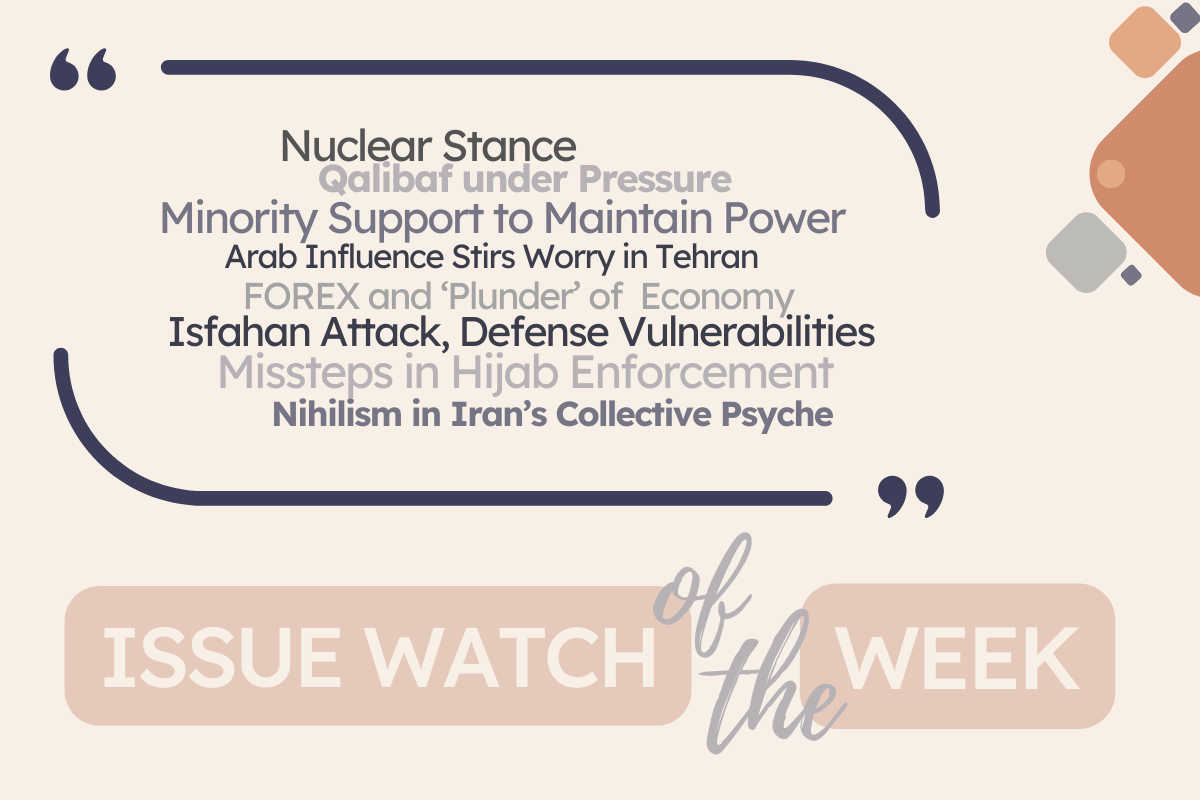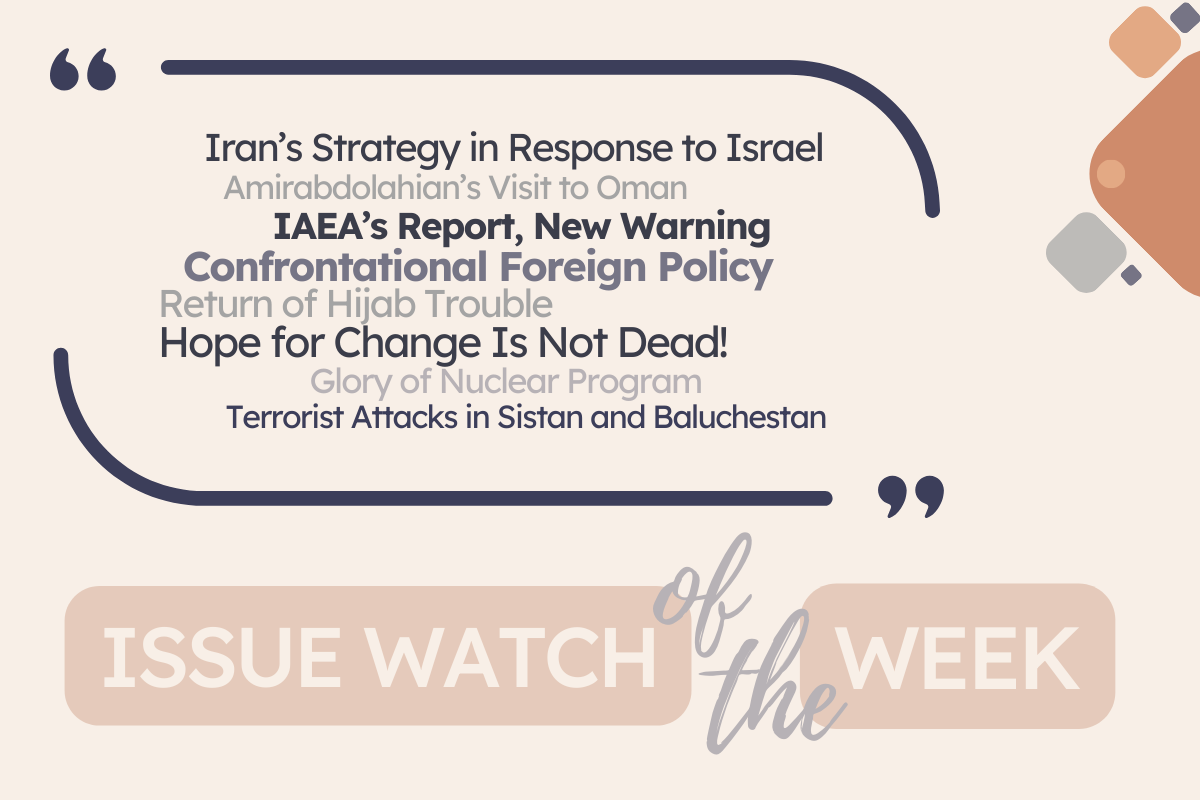For our analytic products on the Iran-Israel conflict, please check the Daily Summary section and read Redlines and Humiliations in the Analysis section.
Unveiling Control via New Hijab Initiative:
The commencement of the new hijab enforcement initiative, dubbed “Nur” (light), signifies the resolve of hardliners in power to assert control over defiant opponents, who appear to constitute the majority. In some respects, this mirrors the recent escalation with Israel; the Nezam’s “strategic patience” following the death of Mahsa Amini and subsequent protests has ended. Despite widespread criticism and warnings about social divisions and resentment, influential proponents within the Paydari Front maintain that hijab encompasses various dimensions, including political considerations, and, therefore, nothing can justify any hindrance to enforcement.
Private Sector Pushback:
As the Majles considers extending weekend holidays to include Thursdays alongside Fridays, the Tehran Chamber of Commerce has issued a statement resolutely opposing the proposed change. While there is acknowledgment that even without this unusual holiday extension, Iran’s economy and trade are already greatly isolated from the rest of the world, this united and dissenting stance from the private sector carries notable significance. Following the administration’s recent decision to annul yet another election within a provincial chamber of commerce, recent actions and statements of private sector members convey a steadfast commitment to preserving the relative autonomy achieved in previous years. This implies that although the hardliners initially believed that annulling the election of the president of the Iran Chamber of Commerce would ease relations, the road ahead may be anything but smooth.
Censorship, Crackdown on Journalists:
The Tehran prosecutor has filed charges against multiple reformist journalists and at least one newspaper, accusing them of disturbing the public peace. These journalists had been reporting on the dire consequences of a potential conflict with Israel, scrutinizing the government’s economic policies, and condemning the recent intensified enforcement of hijab regulations. In reformist circles, there appears to be a consensus that the unjust and ill-advised crackdown is solely targeting viewpoints expressing concern about a potential war. These attempts to control the narrative raise doubts about the genuineness of the widespread support and praise for the attack, as depicted in media headlines on 15 April. At the same time, coupled with the simultaneous push for hijab enforcement, the crackdown may suggest a shift in governance in Iran, indicating the establishment’s fear of potential unrest as it becomes increasingly clear that the majority does not back the regime.
Public Posture, Behind-the-Scenes Positioning:
The Islamic Republic fulfilled its promise of punishing Israel for the killing of IRGC personnel in Syria, launching drones and missiles at Israel, few of which actually reached their targets. Nonetheless, the Nezam is now confidently asserting that it has demonstrated its strength and resolve. Few within Iran have wanted—or dared—to dissent from this view, and perhaps no one wants to drag out the debate now that Iran has declared the matter closed.
Defiant Students Getting under Skin of Dour Officials:
A rash of videos published on social media and showing college graduates celebrating, often accompanied with joyous dancing, has high-level Islamic Republic officials fuming and threatening legal action. As legal experts point out, there is no basis in the law for such prosecution. Another commentator noted that thieves and other criminals have less to fear from the Islamic Republic than celebrating graduates. Reformist leader Azar Mansuri notes that Iranian youth today need convincing and, unlike previous generations, will not bend to demands for obedience. Former education official Gholamreza Zarifian-Shafi’i, a reformist, worries that the administration’s efforts to ideologically purge universities à la the “cultural revolution” of the 1980s will rob them of their value as institutions of learning.
Major Economic Achievements Despite Sanctions:
Minister of Economy Ehsan Khanduzi has good news for the production sector: three important policies by the administration will facilitate this year’s government mandate of a “spurt in production with people’s participation.” First, the government will reduce the tax burden on the production sector by 7 percent. Second, following recommendations from the Central Bank of Iran, the administration will lift foreign exchange restrictions for the production sector. Third, the administration will begin implementing regulations to improve conditions for entrepreneurship through increased predictability and more disciplined actions by the government. Despite international challenges, said Khanduzi, Iran’s trade balance ($153 billion) and foreign investments ($5.5 billion) have been unprecedented during the past 16 years. Other economically oriented news outlets also reported similar numbers and expressed optimism about Iran’s economy, though some economists have accused the administration of manipulating numbers.
Unsuccessful Wooing of Neighbors:
The Ra’isi administration’s project of “neighborly” relations started with a bang, winning the Islamic Republic of Iran a seat at the Shanghai Cooperation Organization in September 2021 and, some two years later, status as part of the extended BRICS family. But despite the so-called pivot to the East, relations with neighbors like Afghanistan and Pakistan remain troubled. How ironic, then, that an analyst evaluates Iran’s current foreign policy in the region as several backward steps from when the administration took over—something he blames on the simplistic and ideological approach of policymakers. A few days earlier, press reports anticipated President Ebrahim Ra’isi’s upcoming visit to Islamabad on 22 April. Supporters of the administration now have to cast about for explanations for the 11 April announcement by Pakistan that it was designating the Zeinabiyyun Brigade, Pakistani expats funded and trained by Iran to fight in Syria, as a terrorist organization.
Shape of Twelfth Majles:
Runoff elections will soon decide the fate of the 45 vacant seats in the Majles, but the battle over the speakership may be more predictable than earlier thought. According to a conservative politician, Mohammad-Baqer Qalibaf remains the number one contender, as the challenge from the ultra-hardline Paydari Front seems to be dissipating. The Paydari cleric Mahmud Nabavian, the top vote-getter in Tehran, is seemingly disinclined to challenge Qalibaf. Instead, it seems former foreign minister Manuchehr Mottaki will throw his hat into the ring. The moderates in the legislature also seem encouraged by apparent disarray among hardliners and hope to forge an effective caucus. Conservative pundit Mohammad Mohajeri is not so sure, suggesting the moderates will be pushed into a deal with Qalibaf in response to being squeezed between the hardliners and radical reformists.
Conservatives Keeping Administration at Arm’s Length:
The Ra’isi administration has failed so miserably at halting the country’s economic slide that many of its most vocal early supporters have either gone silent or are openly critical of the administration. These include the more than 200 MPs who urged Ebrahim Ra’isi to run for president in 2021. Hosein Anvari, a member of the Islamic Coalition Party and former head of the Imam Khomeini Relief Committee, damns the administration with faint praise with his comment that it is doing “something” to improve the economy, but adding that the administration’s measures disregard the welfare of the public. A conservative former MP goes further, squarely blaming the administration for the country’s growing poverty, such as its approach to FOREX.
Security Crisis in Sistan and Baluchestan:
In a second attack within a week, the militant group Jaish al-Adl has claimed the lives of six police officers and left two others injured in Sistan and Baluchestan. Amidst growing concerns over the lack of adequate equipment for security forces in the region, officials, including the minister of interior, are facing severe criticism. In recent days, Zahedan’s Sunni Friday prayer leader Mowlavi Abdolhamid Esma’ilzahi has been targeted by hardliners for suggesting negotiations with Jaish al-Adl and for what they perceive as his role in fomenting tension. These developments unfold against the backdrop of Israeli assaults on Iranian assets in Syria and a brazen mugging incident occurring in broad daylight in Tehran, igniting profound concerns regarding the establishment’s apparent failure to ensure security.
Concerns over Turkey’s Water Projects:
Turkey’s development projects, known as “DAP” and “GAP,” which entail damming rivers such as the Tigris, Euphrates, and Aras, are raising concern in Iran, where experts perceive them as a type of “water terrorism.” The potential alteration of water flow poses risks to critical economic zones and food security in Iran. With peaceful diplomatic efforts on water-related issues proving ineffective, experts recommend elevating the matter internationally to encourage Turkey to collaborate on the management of shared water resources. Some voices advocate for Iran to capitalize on its trade relations with Turkey or the considerable influx of Iranian tourists into the country as potential bargaining chips in negotiation, before the situation reaches a critical juncture.







